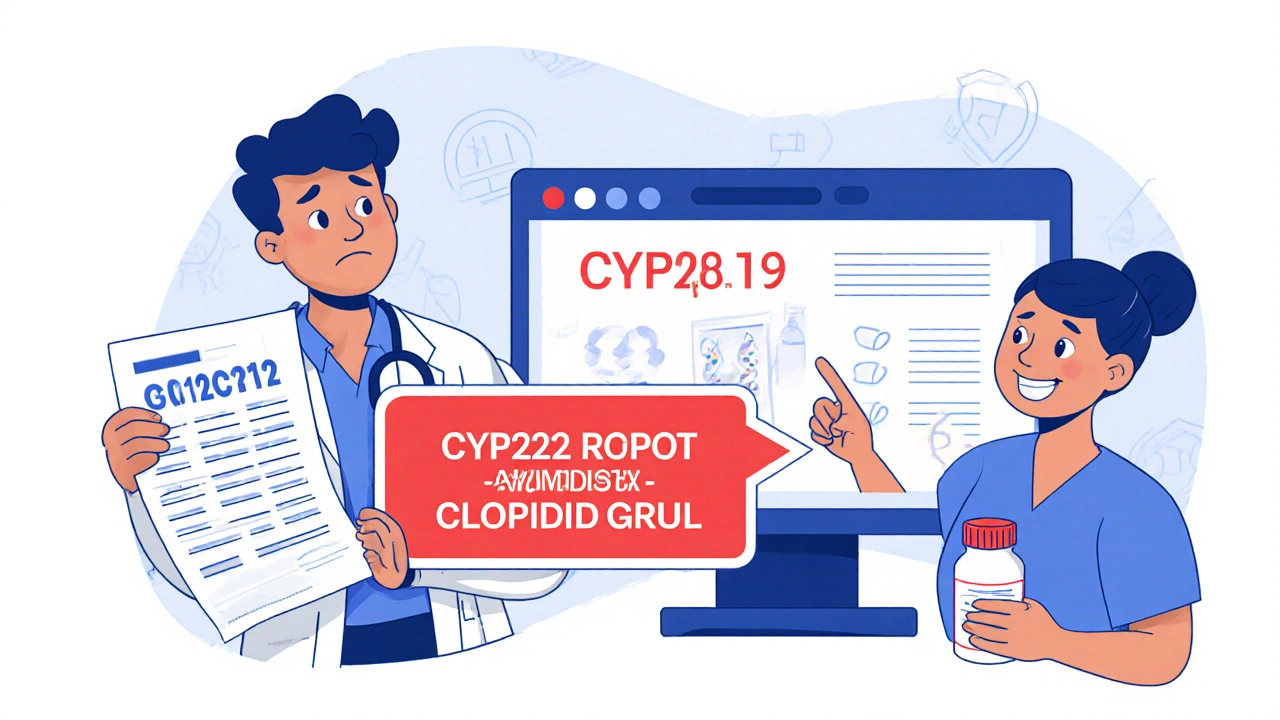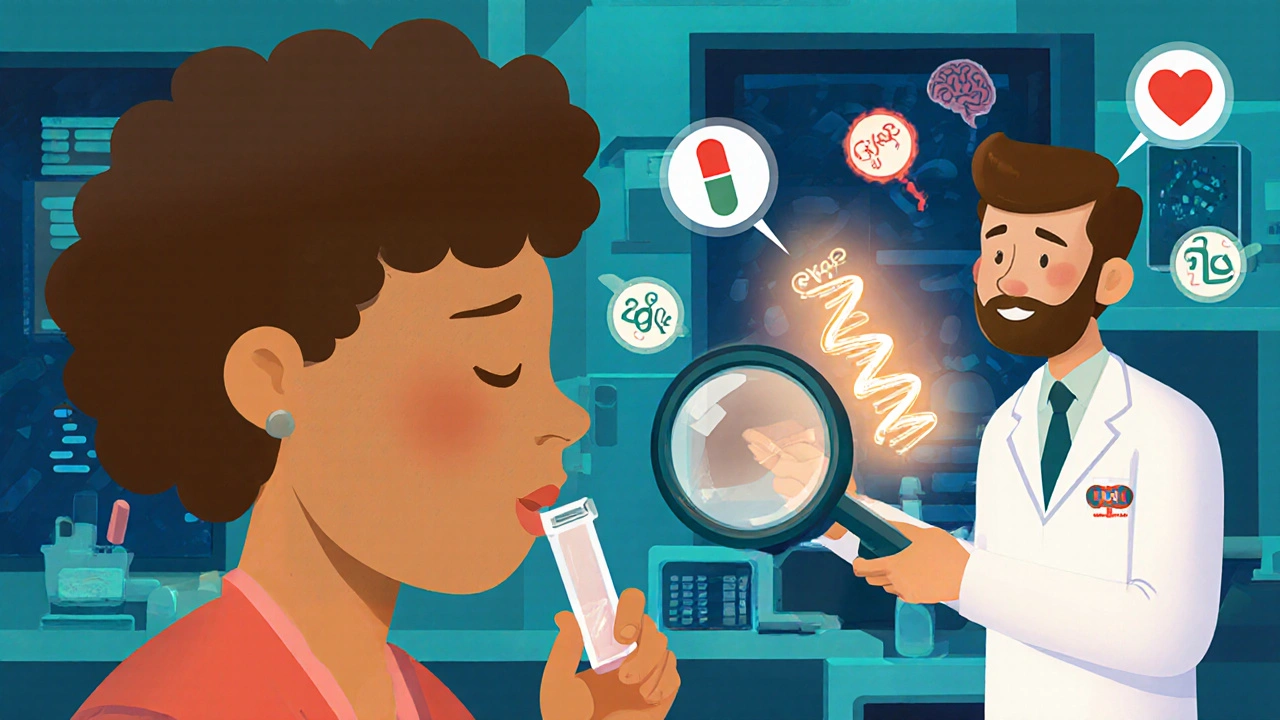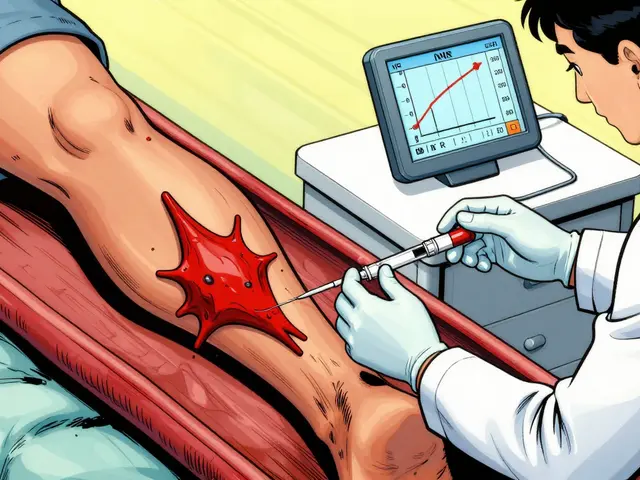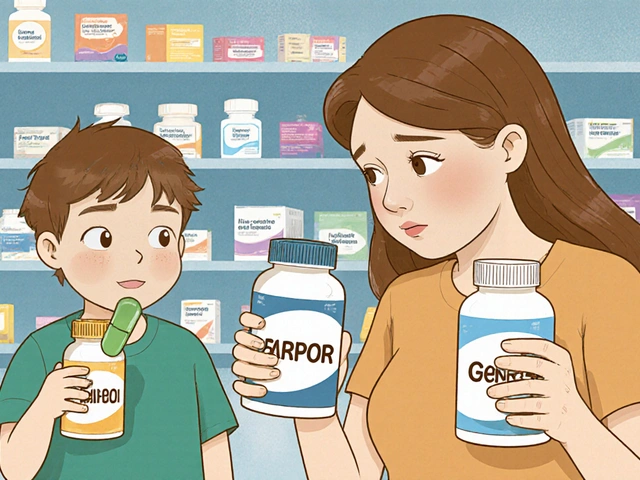Pharmacogenomics Risk Calculator
Predict Your Medication Risk
Select a drug and genetic variant to see your risk level
What Pharmacogenomics Testing Really Means
Pharmacogenomics testing isn’t science fiction. It’s a real, growing tool that uses your DNA to figure out which medications will work - and which could hurt you. Right now, about 70% of Americans take at least one prescription drug. And every year, over 2 million people end up in the hospital because of bad reactions to those drugs. Many of those reactions aren’t random. They’re written into your genes.
This isn’t about guessing. It’s about reading your body’s instruction manual. Certain genes control how your liver breaks down drugs. If you have a variant in the CYP2D6 gene, for example, you might process painkillers like codeine too slowly - meaning they don’t work. Or too fast - meaning you get too much of the active drug and risk overdose. That’s why doctors now test for this before prescribing.
How It Works: From Saliva to Treatment Plan
Getting tested is simple. You spit into a tube or give a blood sample. The lab looks at specific genes linked to drug metabolism. The most common ones are CYP2D6, CYP2C19, and CYP2C9. These genes code for enzymes that handle about 75% of all prescription drugs - from antidepressants to blood thinners to chemotherapy.
Results come back in 3 to 14 days. The report doesn’t say “take this drug.” It says: “You’re a poor metabolizer of CYP2C19, so clopidogrel (Plavix) won’t work for you. Use prasugrel instead.” Or: “You carry the HLA-B*57:01 variant - don’t take abacavir for HIV, or you could have a life-threatening reaction.”
The FDA lists 178 drugs with pharmacogenomic guidance in their labels. That number is rising. In 2022, nearly 3 out of 10 new drugs included genetic instructions. That’s up from just 1 in 10 in 2000.
Where It Makes the Biggest Difference
Pharmacogenomics isn’t useful for every drug. It shines where the stakes are high and trial-and-error is dangerous.
- Psychiatry: Up to 60% of people with depression don’t respond to their first antidepressant. A 2022 study showed that patients who got gene-guided treatment were 30% more likely to go into remission. One patient on Reddit tried five SSRIs with no luck - after testing showed he was a CYP2D6 poor metabolizer, his doctor switched him to bupropion. Within weeks, his symptoms lifted.
- Cardiology: Clopidogrel (Plavix) is meant to prevent heart attacks. But if you have a CYP2C19 poor metabolizer variant, the drug doesn’t activate. Your risk of another heart event doubles. Testing cuts that risk by half.
- Oncology: Tamoxifen, used for breast cancer, needs CYP2D6 to work. If you’re a poor metabolizer, the drug fails. Switching to anastrozole can save lives.
- Pain Management: Opioids like oxycodone and hydrocodone rely on CYP2D6. Poor metabolizers get little pain relief. Ultra-rapid metabolizers can overdose on normal doses.

What It Can’t Do
Pharmacogenomics isn’t a magic crystal ball. Genes explain only 10-15% of why people respond differently to most drugs. The rest? Diet, other medications, age, liver health, and even gut bacteria.
It won’t help with antibiotics like penicillin or common pain relievers like ibuprofen. Those drugs have wide safety margins. No need to test.
Also, not every gene variant is understood. Most research has been done in people of European descent. For Black, Asian, or Indigenous populations, the data is thin. That’s a big gap. A 2023 review in Nature Medicine pointed out that over 90% of potential gene-drug links haven’t been studied in diverse groups.
Cost, Insurance, and Access
A targeted pharmacogenomics test costs between $250 and $500. Whole genome sequencing runs $1,000-$2,000. Most clinics use targeted panels because they’re cheaper and focused.
Insurance coverage is spotty. Only 35% of commercial plans cover it, though Medicare Part B pays for certain tests - like HLA-B*57:01 before abacavir. Some hospitals, especially academic centers, offer testing for free as part of research programs.
Companies like OneOme, Invitae, and Quest Diagnostics offer tests. OneOme’s RightMed panel covers 24 genes and over 350 drugs. It’s FDA-cleared and used in major health systems like Mayo Clinic and the University of Florida.
Why Doctors Aren’t Using It More
Even when patients get tested, doctors often don’t act on the results. A 2022 study found that only 52% of prescribers fully followed pharmacogenomic recommendations. Why?
- Most physicians got zero training in genetics during medical school.
- Reports can be confusing. A 10-page PDF with terms like “intermediate metabolizer” isn’t easy to digest.
- EHR systems rarely flag gene-drug conflicts automatically.
But things are changing. Epic and Cerner now integrate CPIC guidelines into their systems. If a doctor tries to prescribe clopidogrel to a CYP2C19 poor metabolizer, the system pops up a warning. The University of Florida cut turnaround time from two weeks to 48 hours by automating alerts.
Pharmacists are stepping in. 72% of academic hospitals now have pharmacogenomics-trained pharmacists who interpret results and advise doctors. That’s making a difference.
What’s Next
The future is pre-emptive testing. Instead of testing only when you need a drug, you get tested once - maybe as a teen or during a routine checkup - and your results go into your medical record. Every time a doctor writes a prescription, the system checks your genes.
The NIH’s All of Us program has already collected genetic data from over 620,000 people. Results are being returned to participants. By 2030, the Personalized Medicine Coalition predicts half of all U.S. adults will have their pharmacogenomic profile in their medical file.
Point-of-care tests are in development - imagine a cheek swab in the doctor’s office with results in 30 minutes. And polygenic scores, which combine dozens of gene variants to predict drug response, are being tested at 17 universities.
Real Results, Real Challenges
Patients who’ve used pharmacogenomics testing give it high marks. On Healthgrades, the average rating is 4.1 out of 5. Most say they finally found a drug that works after years of trial and error.
But expectations matter. One patient told Medscape: “I thought the test would fix everything. It only helped with three of my ten meds.” That’s normal. Pharmacogenomics doesn’t solve all drug problems - but it solves the ones that kill.
And the savings? The Rand Corporation estimates widespread use could save the U.S. healthcare system $137 billion a year by cutting hospitalizations and ineffective prescriptions.
This isn’t about replacing doctors. It’s about giving them better tools. Your genes aren’t destiny - but they’re a powerful clue. And in medicine, clues matter.
Is pharmacogenomics testing covered by insurance?
It depends. Medicare Part B covers testing for specific drugs like abacavir (for HIV) and clopidogrel (for heart disease). Most private insurance plans still don’t cover routine testing, though coverage is slowly expanding. Only about 35% of commercial plans pay for it today. Some hospitals and research programs offer free testing as part of clinical studies.
How accurate are pharmacogenomics tests?
The tests themselves are highly accurate - they detect gene variants with over 99% precision. But accuracy doesn’t always mean usefulness. We know for certain how certain gene variants affect a few drugs (like CYP2D6 and codeine). For many others, the link is still being studied. The test tells you your genetic risk - not whether a drug will definitely work or fail.
Can I get tested without a doctor?
Some direct-to-consumer companies offer pharmacogenomics tests, but they’re not always reliable or clinically validated. For medical decisions, you need a test ordered by a licensed provider and interpreted by a trained professional. Tests from companies like OneOme or Invitae are CLIA-certified and designed for clinical use. Avoid consumer kits that don’t include medical support.
Does pharmacogenomics testing replace therapeutic drug monitoring?
No - they serve different purposes. Therapeutic drug monitoring (TDM) measures the actual drug level in your blood, which is useful for drugs with narrow safety windows like warfarin or lithium. Pharmacogenomics tells you how your body will likely process the drug before you even take it. Many doctors use both: genetics to choose the right drug, TDM to fine-tune the dose.
Is pharmacogenomics testing only for people with chronic illnesses?
No. While it’s most commonly used for complex cases - like treatment-resistant depression or multiple failed medications - it can help anyone starting a new drug with known genetic links. Even healthy people can benefit from pre-emptive testing, especially if they’re likely to need medications later in life. Some hospitals now offer it as part of routine wellness screenings.
Are my genetic results private?
Yes - under HIPAA, your genetic data is protected health information. Labs that perform clinical pharmacogenomics testing are required to keep it confidential. However, if you use a direct-to-consumer test, check their privacy policy. Some may share data with third parties. Always choose a CLIA-certified provider for medical use.





Dade Hughston
i got tested last year after my doc tried to give me codeine for a back injury and i nearly died from the side effects turns out im an ultra rapid metabolizer of cyp2d6 so my body turned it into morphine like a damn factory and i was sweating and hallucinating in the waiting room lol anyway now my whole med list is mapped out and its crazy how many drugs just dont work on me like sertraline does nothing but bupropion works like magic i wish everyone could get this done before they get prescribed anything
Jim Peddle
The entire premise is built on a foundation of statistical noise. The FDA's list of 178 drugs? Most of those associations are correlation, not causation. And let's not forget the industry that profits from this: labs, biotech firms, EHR vendors. They're not doing this to save lives. They're doing it to monetize genetic anxiety. You think your genes are the problem? What about the 47 different medications you're on because you're on 47 different medications? The system is broken. Genetics is just the shiny new bandage.
S Love
This is one of the most important medical advances in decades and it's being held back by bureaucracy and ignorance. I've seen patients who spent 10 years on antidepressants, cycling through six different SSRIs, only to find out they were CYP2D6 poor metabolizers. Once they switched, their lives changed. It's not magic-it's science. The real tragedy isn't the cost or the lack of insurance coverage-it's that so many doctors still don't know how to read these reports. We need mandatory genetics training in med school. Not as an elective. As a requirement.
Pritesh Mehta
In India, we have no access to this. We have doctors who prescribe based on what the pharma rep brought them last week. I saw a man with diabetes get prescribed metformin after he had lactic acidosis twice. He was told to "try harder." Meanwhile, in the West, they sequence your genome before giving you a pill. This isn't medicine. It's caste system with a lab coat. We need to stop importing Western tech without fixing our own broken systems first. Why should I care about CYP2C19 when I can't even get insulin on time?
Billy Tiger
They say it saves money but who pays for the test first? You do. Then your insurance hikes your premiums because you're "high risk". And what happens when your data gets sold to life insurers? They'll deny you coverage because your genes say you might get cancer in 15 years. This isn't medicine. It's genetic profiling for profit. The FDA is just a front for Big Pharma. They want you hooked on lifelong testing. You think you're getting control? You're getting tracked
Katie Ring
I was on four different antipsychotics for five years. My doctor said I had "treatment-resistant schizophrenia." Turns out I was a CYP2D6 poor metabolizer and every drug was just sitting in my system like sludge. After the test, they switched me to aripiprazole. Within three weeks, I was sleeping through the night. No more hallucinations. No more hospitalizations. I'm not saying this fixes everything. But it fixed my life. And if this tech is only available to rich people in the US, then we're failing at medicine.
Adarsha Foundation
I appreciate this post. In my country, we don't have access to these tests, but I've seen how helpful they can be for friends in the US. I think the real issue isn't the science-it's the equity. We need global standards. Not just for testing, but for sharing data across populations. Right now, the science is biased toward white Europeans. That's not just unfair-it's dangerous. We need to include more diverse genomes in research. Not as an afterthought. As a priority.
Alex Sherman
I find it morally repulsive that we're reducing human health to a genetic algorithm. What happened to clinical judgment? To listening to the patient? To the art of medicine? Now we're handing out DNA reports like fortune cookies and letting algorithms decide who gets what pill. This isn't personalized medicine. It's dehumanized medicine. And the worst part? The people who need it most-low-income, elderly, rural-can't even get the test. So now we're creating a genetic underclass.
Anthony Tong
The entire pharmacogenomics industry is built on a foundation of overhyped, poorly replicated studies. The CYP2D6-codeine link is one of the few solid associations. Everything else? Correlation with p-values just below 0.05. And the FDA's list? It includes drugs where the genetic association is statistically significant but clinically irrelevant. The Rand Corporation's $137 billion savings estimate? Based on optimistic modeling that ignores implementation failure rates. This is not medicine. It's tech bro fantasy dressed in white coats.
Roy Scorer
I had my genome done through 23andMe and then took the results to my psychiatrist. She looked at it, shrugged, and said "we'll just keep trying meds." That's the problem. We're drowning in data but starving for wisdom. I'm not mad at the science. I'm mad at the system. We have the tools to prevent suffering. But we're too lazy, too disorganized, too afraid of change to use them. And the people who suffer? They're the ones paying the price in sleepless nights and failed relationships.
Marcia Facundo
I got tested because I was on five meds for anxiety and depression. None worked. My doctor didn't even know what CYP2D6 was. I had to bring the research to him. After the test, we switched me to one drug that finally worked. I'm not saying it's perfect. But it saved me from another year of crying in my car before work. If this helps even one person avoid the hell I went through, it's worth it.
Justin Vaughan
Let me tell you about my cousin. She's 72, diabetic, on warfarin, and had a stroke last year. They finally did a pharmacogenomics test and found she was a CYP2C9 slow metabolizer. They switched her to apixaban and her INR stabilized overnight. No more bleeding. No more ER visits. She said it felt like she got her life back. This isn't sci-fi. This is real. And the fact that most doctors still don't use it? That's the real tragedy.
Manuel Gonzalez
I got tested after my mom had a bad reaction to a blood thinner. She didn't know she was a CYP2C19 poor metabolizer. We got the test done through a hospital program-free. Now my whole family has our profiles on file. My doctor says it's like having a cheat code for prescriptions. I'm not saying it's perfect. But it's the closest thing we have to a personalized health roadmap. And yeah, insurance still sucks. But it's worth pushing for.
Brittney Lopez
I work in a clinic that does pharmacogenomics testing for teens starting antidepressants. One girl came in after six failed meds. Her test showed she was a CYP2D6 ultra-rapid metabolizer. We switched her to vortioxetine. Two weeks later, she texted me: "I laughed today. For the first time in two years." That's why we do this. Not because it's trendy. Because it saves lives. We need more of this. Not less.
Jens Petersen
Pharmacogenomics is the new eugenics wrapped in a lab coat. They're not trying to help you-they're trying to classify you. Your genes become a liability. Your insurance premium goes up. Your employer finds out. Your kids get flagged before they're even born. This isn't medicine. It's a corporate surveillance tool disguised as progress. And the worst part? You're supposed to be grateful for it. "Oh thank you for testing me!" No. Thank you for turning my body into a data point.